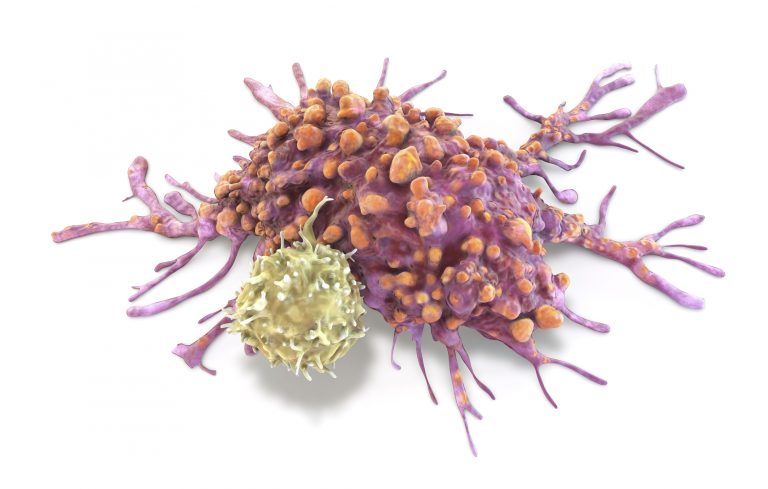
Scientists at the UCLA Jonsson Comprehensive Cancer Center describe a new combination therapy that has the potential to treat BRAF mutated melanoma and additional aggressive subtypes of cancers including melanoma, pancreatic, colon, and lung cancers that harbor common mutations in cancer genes called RAS or NF1.
The mitogen-activated protein kinase (MAPK) pathway is an important bridge in the switch from extracellular signals to intracellular responses. Overactivation of the MAPK pathway is an important driver of many human cancers. Scientists have used therapies that target the MAPK pathway, however, they have only been effective in a few cancers with mutations in a cancer gene called BRAF, and unfortunately, the cancers end up developing resistance.
Their study, “Durable Suppression of Acquired MEK Inhibitor Resistance in Cancer by Sequestering MEK from ERK and Promoting Anti-Tumor T-cell Immunity,” is published in the journal Cancer Discovery.
“MAPK-targeting in cancer often fails due to MAPK-reactivation. MEK inhibitor (MEKi) monotherapy provides limited clinical benefits but may serve as a foundation for combination. Here, we showed that combining a type II RAFi with an allosteric MEKi durably prevents and overcomes acquired resistance among cancers with KRAS, NRAS, NF1, BRAFnon-V600, and BRAFV600 mutations,” the investigators wrote.
“The idea behind this study was to develop a combination treatment that helps people with common lethal cancers by eliciting durable anti-tumor responses,” said senior author Roger Lo, M.D., Ph.D., a professor of medicine at the David Geffen School of Medicine at UCLA and member of the UCLA Jonsson Comprehensive Cancer Center. “Right now, MEK inhibitors by themselves provide limited clinical benefits, and the current MAPK pathway-targeted, combination therapy can help only certain patients with cancers harboring specific BRAF mutations.”
The investigators used patient-derived models of melanoma, non-small cell lung cancer, pancreatic cancer, and colon cancer as well as mouse tumors that mimic these human cancers. The team evaluated how the combination of type II RAFi plus MEKi impacts the MAPK pathway inside the cancer cells and the body’s cancer-fighting immune or T cells over time in order to achieve long-term response by suppressing drug-resistant clones.
The next-generation combination works by two mechanisms that can suppress drug-resistant clones. First, the two small molecules lock RAF and MEK proteins in the MAPK signaling pathway into a tight complex. Keeping these molecules together allows the drugs to block the MAPK pathway. The combination then prevented a weakening of killer T cells inside the tumor and promoted T-cell clonal expansion.
“It is quite remarkable that two drugs were able to bind to each of two proteins and sequester them from further propagating signals inside the cancer cells,” said co-senior author Gatien Moriceau, Ph.D., assistant adjunct professor at the David Geffen School of Medicine at UCLA.
“The combination unexpectedly preserves killer T cells inside the tumors, which allows them to hunt down drug-resistant tumor clones,” pointed out Moriceau. “This favorable impact on T cells paves the way to combine MAPK-targeted therapies with anti-PD-1/L1 immune checkpoint therapy.”
This novel combination therapy holds promise for patients who relapse due to cancers becoming resistant and may lead to further advancements in targeting the MAPK pathway. The combination of type II RAFi plus MEKi is currently being tested in clinical trials in both melanoma and other solid cancers such as non-small cell lung cancer.













